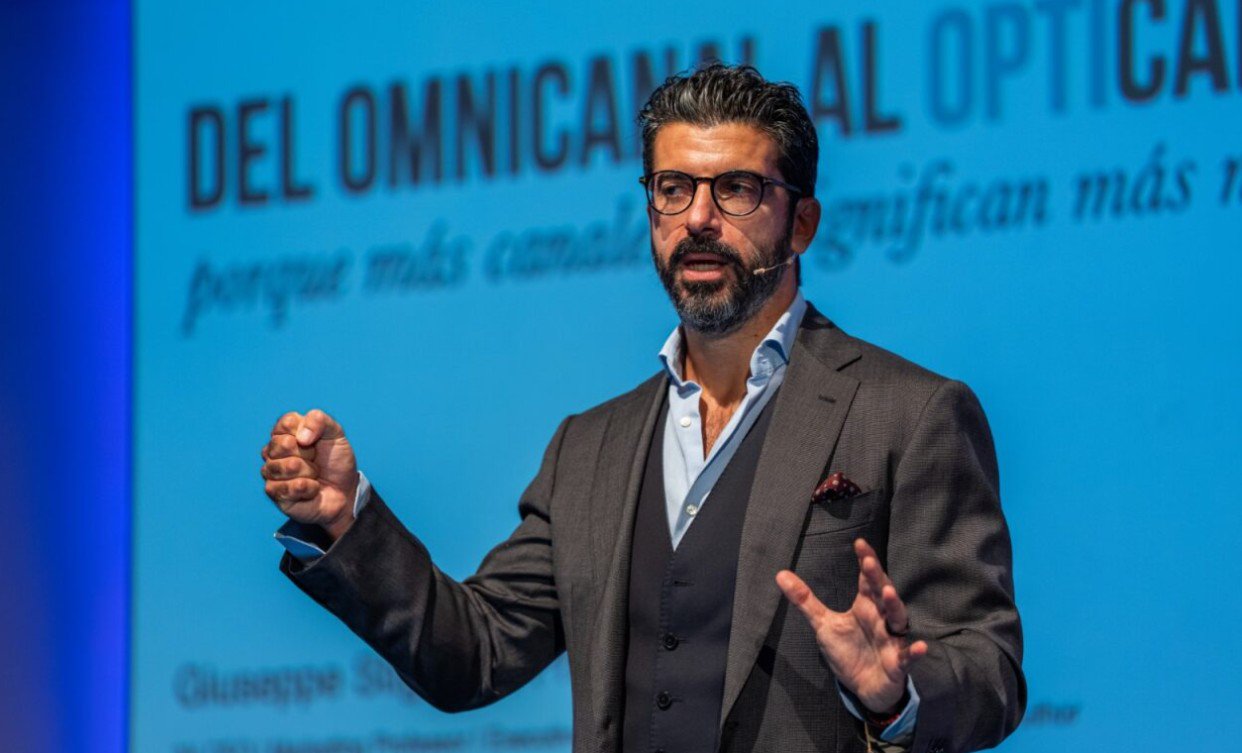AI is neither distant nor difficult: it is already present in Google searches, on Netflix, and on smartphones.
“We are facing a generational opportunity to reengineer our professions and our lives, delegating the most basic, repetitive tasks to AI, repetitive tasks, which, according to cautious estimates, take up around 20% of our working time. This is equivalent to freeing up 20% of the scarcest resource we have: our time.” This is how Giuseppe Sigliano defined the role of AI in the keynote speech he gave at the Spanish Congress of Shopping Centres and Retail Parks. “How we reallocate the time gained will mark the difference between those who lead and those who barely survive. AI can enrich the quality of our work and our lives…or simply translate into a mere increase in productivity."
Whatever the outcome, he is clear that, over the next three years, the logic of many markets will be rewritten and the characteristics of many sectors will be redefined.
Are we ready for AI or are we underestimating its speed?
Giuseppe Sigliano: Most companies and societies underestimate the speed at which AI is being implemented. It was the same with the Internet and smartphones: first, we think they are ‘fads’, then we think they will arrive ‘later’. When we realise that they are here, they are already ubiquitous. Today, AI is not science fiction: it is in search engines, recommendation systems, logistics... The question is not whether we are ready, but how quickly we are able to learn and adapt.
Which sectors will be most impacted over the next three years?
GS: In the short term, sectors with a significant amount of structured, repetitive data. In retail and e-commerce, AI will revolutionise demand forecasting, dynamic pricing and customisation. In the healthcare sector, it will be used for assisted diagnosis and drug discovery. In finance, it will enable risk management, fraud detection and personalised advice. In marketing and communication, it will help with content creation and advanced segmentation.
How does AI affect our experience in physical environments?
GS: AI can connect the digital with the physical through stores that adjust their product range according to local buying patterns. Cameras with computer vision can be installed to reduce queues or improve layout. Data-driven immersive experiences can also be generated. For example, Sephora and Nike use AI to personalise in-store recommendations. The value lies in making the customer feel that the experience ‘understands me’ without losing the human touch.
“AI can connect the digital with the physical through
stores that adjust their product range according
to local purchasing patterns”
What specific benefits can be gained in terms of operational efficiency and personalisation?
GS: It can improve operations through inventory forecasting, waste reduction and logistics optimisation.
Consumer analysis using AI allows us to detect patterns that are invisible to a human analyst. This leads to greater personalisation, making tailored recommendations in real time, both online and offline.
The significant benefit is added efficiency and relevance: at a smaller cost to the company, more value is obtained for the customer.
Does AI enable shopping centres to better adapt to online commerce?
GS: AI makes it possible to analyse the flow of footfall and optimise the retail mix, design physical experiences that complement the online channel, and turn the shopping centre into an ‘experience hub’ that does not compete with e-commerce, but coexists with it.
What are the most common mistakes when starting to use AI?
GS: Expectations (hype) and actual results are not always aligned. Although many companies already use generative AI, the vast majority report that these initiatives do not have a material impact on profits. This gap between use and actual value is typical of the hype phase of any technology.
The company may suffer from organisational silos, fragmented initiatives and a lack of strategic leadership. When AI is launched by multiple functions, within an organisation or business, without a comprehensive vision or CEO support, initiatives become scattered, efforts are duplicated and global synergies are not generated.
It is very dangerous to ignore the quality and accessibility of data. Poor, fragmented, or inaccessible data is one of the main obstacles to take into account: without quality data, AI fails.
The focus should not be on technology, but on processes (workflow). Many companies begin to introduce models or agents without rethinking their processes. If AI is ‘superimposed’ on pre-existing flows and governance frameworks, its impact will be limited.
Finally, many AI projects remain at the prototype stage because security, costs and risks are not adequately addressed when transitioning to scale.
“AI can memorise data and rules (know-that),
but it cannot replace practical
wisdom (know-how)”
How does this technology help with decision-making in areas such as promotion, retail mix and footfall?
GS: AI can simulate promotion scenarios and predict the impact on sales and
margins, optimise the tenant mix in a shopping centre using data on
footfall and customer profiles, predict peaks in visitor numbers, and adjust resources (security, cleaning, staffing, etc.).
What are the emerging trends?
GS: Digital twins are being created, as virtual representations of consumers and stores, to simulate decisions before implementing them. Generative AI is being applied to marketing to create hyper-personalised content on a large scale. Progress is being made in integration with the Internet of Things (IoT), through sensors that feed AI with real-time data. Progress is also being made in ethics and regulations, so that the transparency and governance of AI are seen as a competitive advantage.
What are the irreplaceable human skills?
GS: AI can memorise data and rules (know-that), but it cannot replace practical wisdom (know-how): the art of applying criteria with intuition, context and true experience.
The real world does not always have clear answers. Knowing how to live with ambiguity, ask good questions and navigate grey areas remains a deeply human skill.
Organisations are not purely rational systems. They require leaders capable of reading emotions, hidden interests and power games for AI to have a real impact.
The machine can suggest what is ‘optimal,’ but only people can decide what is right. Moral and ethical judgement will remain one of the indispensable roles of human beings.



